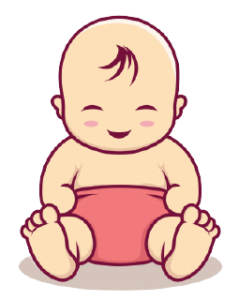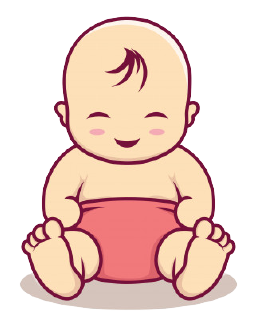We never want our babies to be sick but they tend to get ill frequently in the first few years of their life. Colds and coughs will not be a stranger in a house with a kid or more. Watching your baby make an “O” with their tiny lips and coughing forcefully is a hurtful sight to all of us parents.
When a little one is coughing continuously without a reason, it is much more stressful for everyone around the baby. If your baby has a dry cough and you wonder what caused it, this article is meant for you. Keep reading to know what diseases cause a dry cough and what you can do about it.
CONTENT
2. What can cause dry cough in babies?
3. Home remedies for dry cough
1. What is a dry cough?
Coughs come to our days in different forms as dry coughs and wet coughs. Wet coughs produce mucus or phlegm or sound like it does so. Dry coughs do not produce or sound like it is involved with phlegm or mucus. Many reasons can cause dry cough in babies ranging from a cold to inhalation of irritants. Both dry and wet coughs are a mechanism initiated by the immunity system to push out harmful elements from our bodies.
2. What can cause dry cough in babies?
Asthma
Asthma makes it difficult for babies to breathe. This is a chronic illness caused by narrowing of the respiratory tract and its inflammation. Asthma can be triggered by different factors and they will differ from a person to another. Exercise will be a trigger for some people while environmental irritants or respiratory diseases can trigger asthma in others.
Some kids have a chronic cough which is the only symptom of their asthma condition. This condition is called cough-variant asthma. Both dry and wet coughs can be a symptom of asthma and babies or kids will experience spells of coughs at night or when they are physically active. If you can hear a whistling sound when your baby breathe after or during a spell of cough, it is more likely to be asthma. Other symptoms of asthma include,
- Difficulty in breathing
- Shortness of breath
- Fast breathing
- Lethargy
- Chest tightness or pain
When a child is diagnosed with asthma, your doctor will develop an asthma action plan with your help. It will consist of information about asthma triggers of your baby, prescribed medications, and guidance to use them. There will be two types of asthma medication used to treat asthma the daily preventative medications and quick-relief medications.
Viral infections
Viral infections can cause inflammations in the respiratory tract of a baby. These inflammations can lead to dry coughs. Here are few such common viral infections that can cause dry cough in a baby.
- Common cold
- Influenza
- Croup
- Pneumonia
- Bronchiolitis
The sound of the cough will vary depending on the nature of the infection. Some babies have a hoarse-sounding cough while some have a cough that sounds more like wheezing. Mucus might flow down to the throat during the night causing further irritation. This can worsen the cough of your baby at night. Other symptoms of a viral infection include fever, runny or stuffy nose, sneezing, headache, body aches, and pains.
Babies or toddlers who are going through a viral infection must be allowed to rest well and provided with plenty of fluids. As viruses do not respond to antibiotics like bacteria, the only option is to rest well and stay hydrated.
For babies who are older than six months, you can give ibuprofen (Motrin, Advil) or acetaminophen (Tylenol) to ease the body pains and fever. Aspirin is not appropriate for babies and kids as it can cause Reyes syndrome. Cough can last for few weeks after other symptoms of the viral infection go away. The post-viral cough does not need treatment and will heal by itself within another week or so.

Whooping cough
This is a contagious bacterial infection in the respiratory tract and is also called pertussis. The bacteria involved with whooping cough produce a toxin which damage and swell the airway of the infected person. The damaged and swollen airways will cause a cough that is uncomfortable for the patient.
Babies with whooping cough will experience long episodes of coughing with breathing difficulties. These breathing difficulties followed by the cough will have the kids breathing very deeply making a “whooping” noise. Fever, sneezing, and runny nose are other symptoms of whooping cough. There are vaccines available to prevent whooping cough but if your baby gets infected someway, you need to seek immediate medical treatments which will include a course of antibiotics.
Irritants
Your baby can be exposed to different irritants inside or outside of the house. These irritants will inflame the throat of the baby leading to a dry cough. Below are some common irritants that can cause cough in babies.
- cigarette smoke
- car exhaust
- air pollution
- dust
- mold
- too cold or too dry air
Dry cough caused by irritants will go away once the baby is removed from the environment with the irritant. But if your baby is exposed to irritants for a longer period regularly, the dry cough can become chronic.
Allergies
Our immunity systems can mistakenly recognize a non-harmful substance as a danger and severely act against it. These reactions are called allergies and the substances which cause allergies are called allergens. There are different types of allergens affecting people such as certain food, animal dander, pollen, or medicines. The best way to avoid allergies is to prevent the exposure to allergens when it is identified.
During an allergic reaction, a chemical called histamine is released which can cause symptoms related to the respiratory system. Therefore, a hoarse, dry cough can appear with an allergy. These are few other symptoms of an allergy.
- sneezing
- itchy, watery eyes
- runny nose
- rash
If your child has an allergy, prevent exposure to those allergens. You can buy over-the-counter medications to relieve the symptoms of an allergy but it is always safe to consult a doctor before taking such medications. For children who experience frequent allergies, you will have to meet an allergy specialist for a long-term treatment plan.
Somatic Cough
Some coughs can be a result of a psychological problem or distress. These kinds of coughs that have no clear cause are referred to as somatic coughs by medical experts. Somatic coughs will affect the day-to-day life of a kid and will last for six months. When all the reasons for the dry cough in your child are ruled out, it will be diagnosed as a somatic cough and you will be directed to a psychiatrist or for treatments such as hypnotherapy.
3. Home remedies for dry cough
- Dry air can dry up the respiratory system of your baby which can cause a cough. Use a humidifier to increase the humidity inside your house.
- Turn on the hot water shower and close the bathroom. When the steam is collected inside the room, sit in there with your child and inhale the warm, moist air. You can also inhale warm steam coming out from a hot water pot. But you have to make sure that the steam is not too hot for your baby and there is no risk of hot water spilling onto your baby.
- If your baby’s throat is sore after coughing, give him warm water, tea, or some other warm fluid that he likes.


